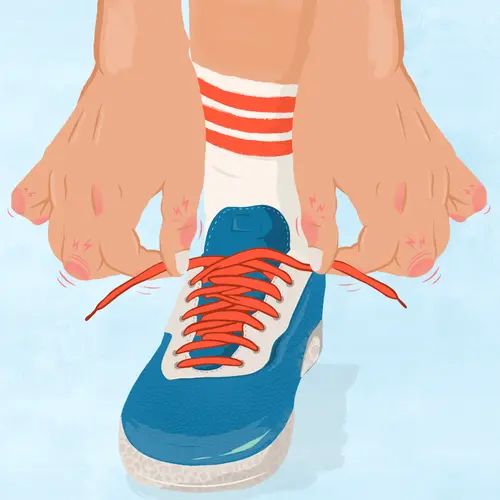Lesson 7 of 8: Sticking to Your Medication Regimen

Hide Video Transcript
Video Transcript
NEKETIA HENRY
Every case is different. But remission or low disease activity remains a realistic goal for most patients with rheumatoid arthritis. Getting there depends on following a treatment plan, at the center of which is therapy that likely involves one or more Disease-Modifying Antirheumatic Drugs, or DMARDs, to help control your RA. Sticking with a medication regimen in RA is a pretty tall order, as it is for other chronic conditions. You're probably wondering, is that ever possible to take less medication or even a drug holiday? ALLAN GIBOFSKY
Rheumatoid arthritis is a chronic condition that doesn't go away. Achieving remission can certainly feel like a cure. But RA is fairly unpredictable. So achieving remission is no guarantee that you will remain there. Medications are generally the cornerstone to try to maintain remission. If you do go into remission, there should be a discussion with your physician about potential next steps. One option might be to take a lower dose or fewer medications or possibly see if you can stop taking medication altogether, even if only temporarily, a so-called "drug holiday."
All drugs have side effects and are an expense. So it makes complete sense to want to reduce or stop them. But whether you can actually remain in remission while tapering or stopping medication is something we don't have any reliable way of predicting. And there are some downsides. Stopping medication comes with a risk of falling out of remission, having pain and other symptoms that can suddenly be difficult to control, or finding that the same medications might not work as well when you restart them.
Complete treatment withdrawal for any length of time is probably going to be effective for only a very small number of patients. Maintaining remission with a reduced dose regimen is probably the best option for many people. RA may still be active, even though signs of it appear to be gone. But if you do take a drug holiday, it's important that you and your doctor continue to monitor for signs of worsening disease or joint damage. And you should never stop your medication or reduce the dose on your own without notifying your doctor.
NEKETIA HENRY
Treatment is not a take it or leave it proposition, but really a collaborative effort with your physician to help you achieve your goals using a variety of means. One obvious issue is potential side effects of RA medications and having an open discussion about how to deal with them. ALLAN GIBOFSKY
All medications come with side effects. In RA, they run the gamut from nausea or upset stomach to headache or drowsiness to injection site reactions to potential allergic responses, just to name a few. If a side effect is life-threatening, the drug must be stopped immediately. When the side effects are not dangerous or life-threatening, there may be measures to minimize the side effects. Sometimes, lowering or splitting the dose or adding a medication to counteract the side effect may work. Some side effects lessen over time as the body acclimates to a particular drug or if the drug is taken in a different form or with food. But if side effects persist, it's important to have a conversation with your doctor to weigh the risks and benefits of a particular treatment and discuss potential alternatives. NEKETIA HENRY
Flares are never good news and can become a major source of anxiety. What should you do when they happen? And more importantly, how can you work with your physician to keep them under control? ALLAN GIBOFSKY
It's pretty common to have intermittent bouts of pain or discomfort during treatment. Sometimes, a short course of steroids can be enough to stop the pain and discomfort before returning to a normal cycle of maintenance. Stopping medication is often a cause of relapse. Over time, some patients may also stop responding to or become resistant to their therapy. When that happens, it's important to consider adding other medications to the regimen or perhaps changing drugs altogether.
Regardless of the potential cause, it's critical to let the physician know as soon as you begin to experience pain or discomfort. This allows for discussion of a treatment plan and quick action to help the patient feel better and prevent joint damage.
NEKETIA HENRY
A major challenge for those of us with RA is the trial-and-error process of finding the right medications to treat the disease. Probably like many others, I've often found myself just willing to tough it out, even though I wasn't necessarily where I wanted to be. When is it time to switch? ALLAN GIBOFSKY
When using a treat-to-target approach, the doctor and patient should first agree on a target, either remission or low disease activity, and then adjust the treatment plan as needed until the target is reached. While this can involve personal subjective factors, there are certainly various signs to suggest the patient's drug regimen is not working as well as it should be. An obvious one is the emergence of different symptoms. If a patient comes in complaining of morning stiffness, more swollen joints, or more fatigue, it's probably time to consider another option. Non-efficacy there's another major reason. If, after several months on a medication, a patient has ongoing or worsening joint pain, worsening swelling, and stiffness, then switching is, clearly, warranted.
For patients who are in remission, we tend to take a conservative approach and keep them on their current regimen, perhaps adjusting or even stopping medication as needed. But when a patient has been in remission, even for a long period of time, and starts to develop symptoms or if you notice a change in the laboratory results, imaging, or physical exam, then you have to consider a medication change. The good news is that there are many treatment options available to choose from.
NEKETIA HENRY
In addition to drug therapy, there are many nonpharmacologic strategies that are proven to help people with RA. Join me next time, when we discuss alternative therapies. 